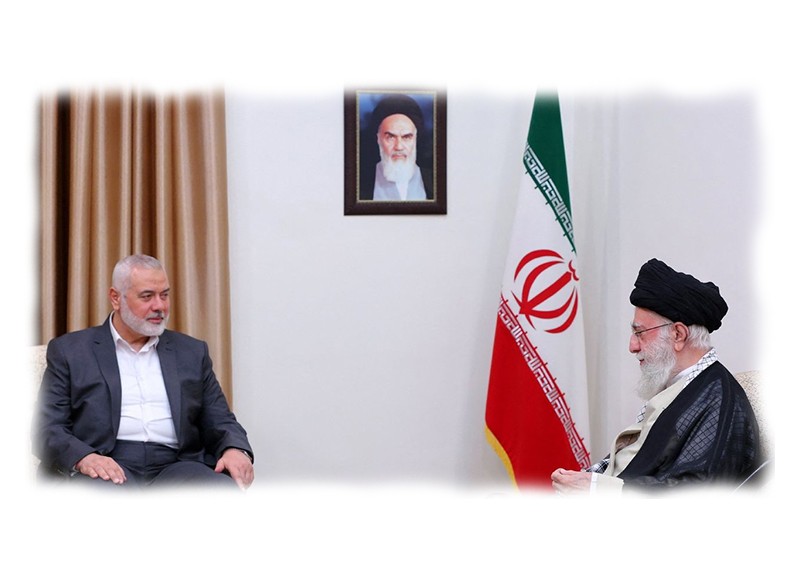
If you understand how the Islamic Republic’s power centers work, it becomes clear what happened.
By Shay Khatiri - WSJ
Shortly after Hamas's assault on Israel, The Wall Street Journal, relying on Hamas sources, reported that the Islamic Republic of Iran had green-lit the Oct. 7 attack. U.S. government officials said they don't have evidence of Iran's involvement, and Tehran itself claims that Hamas is an independent actor. But American and Israeli intelligence agencies' lack of evidence isn't surprising, since they also failed to predict Hamas's attack. Those who understand the Islamic Republic's regime find it hard to believe that Supreme Leader Ayatollah Ali Khamenei didn't give his consent.
In the U.S., elected officials and political appointees make policy, and permanent bureaucrats implement it. In the Islamic Republic, the opposite is true. Elected officials and political appointees implement the policies of the permanent state. Mohammad Khatami, a former president, once referred to himself as "the system's logistics officer."
Iran's permanent state begins with Mr. Khamenei, whose every decree supersedes the law. Military and administrative chains of command are determined by access to power, not laws. The chief of the general staff is the highest-ranking military officer, for instance, but the head of the Quds force calls the shots. The Quds Force is the unconventional-warfare branch of the Islamic Revolutionary Guard Corps, one of the regime's two military forces.
Javad Zarif, a former foreign minister, made this clear in a leaked interview two years ago. He suggested that he wanted to pursue diplomacy but since the permanent state's preferred strategy was "the battlefield" dictated by Quds Force commander Qassem Soleimani, "diplomacy was sacrificed for the sake of the battlefield."
Understanding this structure is crucial in investigating the extent of Iran's involvement in the war. If journalists' sources in the Islamic Republic's government aren't in Mr. Khamenei's policy-making circle, they are unlikely to have known about Tehran's involvement. In the same vein, the intelligence community is unlikely to uncover crucial information by intercepting communications among people outside Mr. Khamenei's office. Iran primarily fights the U.S. and Israel through proxies and in "gray zone" measures such as cyber operations. This falls within the portfolio of Brig. Gen. Esmail Qaani, who became Quds Force commander after a U.S. strike killed Soleimani in 2020. Gen. Qaani is one of a handful of Islamic Republic officials in Mr. Khamenei's circle.
After Mr. Khamenei gave the green light, Gen. Qaani and other officials, using the supreme leader's authority, instructed the rest of the regime without explanation to shuffle around money and materiel for Hamas. In this case, a mid-rank Hamas official with ties with senior Quds Force commanders is a more reliable source than the Iranian foreign minister or even president.
According to the Islamic Republic's official accounts and the Journal's reporting, Gen. Qaani met with Hamas and Palestinian Islamic Jihad officials in April and June. That was when talks with the U.S. about releasing Iran's frozen assets were gaining steam and Washington was easing up on sanctions enforcement. Meanwhile, Iran began to claim responsibility publicly for the uptick in Palestinian violence in Israel. It was a ruse to pull Israel's attention and military and intelligence resources away from the Gaza border.
Iran's motives and timing are clear. In an August deal for five American hostages, the U.S. agreed to release five imprisoned Iranian nationals and transfer $6 billion to Qatar for Tehran's use. A report followed that Mr. Khamenei had granted permission for nuclear negotiations while oil exports had reached their pre-sanctions peak. Mr. Khamenei likely didn't expect the U.S. approach to persist after Hamas's attack. His regime had accumulated enough wealth to survive for several more years. His green light for nuclear negotiations was nothing but deception. The only surprise for Tehran likely came last week when the U.S. allegedly froze the $6 billion-a move Qatar disputes.
Israel has been preoccupied by Tehran's nuclear program and its northern border-Iran's military resides in Syria, and Hezbollah threatens from Lebanon. Despite the calamities caused from Gaza, the northern border poses a much greater military threat.
Hamas and Islamic Jihad have their own political objectives for this attack, but Iran is likely to be the largest beneficiary. The regime expects Israel's national-security policy to reorient toward the Palestinians, relieving Tehran of military pressure in Syria and Iraq. Iran thinks it will be free to advance its nuclear program while Israel tries to deal with Hamas, prevent a third intifada, and protect its northern border.
While it is too soon to tell whether this bet will pay off, it already is clear that Mr. Khamanei approved of this war and stands to gain from it.
Mr. Khatiri is a senior fellow at the Yorktown Institute.














